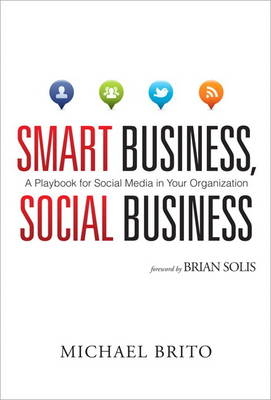
Smart Business, Social Business
Que Corporation,U.S. (Verlag)
978-0-7897-4799-0 (ISBN)
- Titel ist leider vergriffen;
keine Neuauflage - Artikel merken
Proven solutions for the real people, process, and technology obstacles businesses face in using social media behind the firewall.
How to have the successful internal conversations with stakeholders, partners and global teams that lead to successful external conversations with the social customer
Strategies for improving organizational dynamics, collaboration, governance, training, engagement, policies, technology integration, workflows, social CRM, and metrics
Many organizations today have already evolved into social brands. They may be active on Twitter and Facebook; they may have corporate blogs and communities and they are trying hard to engage effectively with the social customer. However, behind the firewall, chaos, anarchy, and conflict reign. In Smart Business, Social Business, leading enterprise social business consultant shows how to build an internal framework based on change management that will lead to success with social media: one that will make external engagement more effective, meaningful, and sustainable. Michael Brito systematically identifies the internal culture, process and technology obstacles to long-term success with social media, and offer best practice solutions. He discusses a wide spectrum of issues, offering actionable intelligence and helping decision-makers build strategies and plans that deliver value. Topics addressed include change management, organizational models and dynamics, internal communications, collaboration, governance, metrics, training, employee activation, policies, technology integration, workflows, social CRM, and much more. Drawing on his own experience working for Silicon Valley companies, HP, Yahoo! and Intel, Brito presents dozens of examples and case studies. Using this book, companies can begin to transform their organizations from just a "social brand" to a fully collaborative and dynamic "social business.”
Michael Brito is a vice president at Edelman Digital and leads the digital team in Silicon Valley. He provides strategic counsel, guidance, and best practices to several of Edelman’s top global tech accounts and is responsible for driving new business, growing existing business, mentoring junior staff members, and maintaining strong client relationships. Previously, Michael worked for major companies in Silicon Valley, including Sony Electronics, Hewlett Packard, Yahoo!, and Intel Corporation, working in various marketing, social media, and community management roles. He is the founder of Silicon Valley Tweetup and is actively involved in the Social Media Club, Silicon Valley Chapter. He is a business advisor for the social media marketing company Izea and online resource MarketingZone.com; a business advisor to Lonesome George & Co.; and he is an early investor of social business hub OneForty. He is a frequent speaker at industry conferences as well as a guest lecturer at various universities, including Cal Berkeley, the University of San Francisco, Stanford University, Syracuse University, and Saint Mary’s College of California. Michael has a Bachelor of Arts in Business degree from Saint Mary’s College and a Master of Science, Integrated Marketing Communications degree from Golden Gate University. He proudly served eight years in the United States Marine Corps. Michael believes that marketing can be evil at times; but if done right, it can drive customer loyalty, product innovation, and brand advocacy. He believes that marketers need to spend more time listening to the social customer and less time sending one-way marketing messages. He is confident that if brands love their customers, they’ll love them back and tell others about it. He also believes that organizations cannot and will not have effective, external conversations with consumers, unless they can have effective internal conversations first.
Foreword by Brian Solis xvii
Introduction 1
Chapters at a Glance 4
Based on Actual Events 7
Chapter 1: Human Capital, Evolved 9
Driving Cultural Change in the Social Business 10
Tearing Down the Silos for Organizational Growth 13
Communicating Successful Failures 16
Qantas Airlines: No Crash, Despite Lots of Rumors 16
Domino’s Pizza YouTube Crisis 17
Motrin: Does Anyone Listen to Baby-Wearing Moms? 18
Gaining Executive Sponsorship to Facilitate Change 20
Activating Employees to Engage in Social Media 21
Fundamentals of Community Management 24
Establishing Continuity in the Global Landscape 26
Standard Organizational Models for the Social Business 29
Who Really Owns Social Media? 34
Taking the Next Steps 34
Chapter 2: Surveying the Technology Supermarket 37
Choosing the Right Social Software 39
Jive 39
Microsoft SharePoint 41
IBM 41
Box.net 41
Tibbr 42
Yammer 42
Cisco WebEx Meeting Center 43
Social Listening Software Commoditized 44
Radian6 44
Lithium Social Media Monitoring (Formerly ScoutLabs) 46
Meltwater Buzz 47
Social Relationship Management Applications 48
Sprinklr 49
Awareness 49
The Syncapse Platform 49
Hearsay Social 50
Real-Time Analytics and Publishing Efficiencies 51
The Future of External Social Technologies 52
The Entire Internet Will Be Facebook 53
Network Consolidation 54
Taking the Next Steps 56
Social Technologies 56
Build a Listening Station: Listen and Act 57
Chapter 3: Establishing a Governance Model 59
Crafting Social Media Policies and Procedures 62
Transparency and Disclosure 66
Moderation 66
Training and Organizational Intelligence 68
Noncompetitive Collaboration 71
Social Media Executive Councils 72
Taking the Next Step 73
Chapter 4: Embracing the Social Customer 77
The Value of a Social Media Practitioner 78
Hiring Social Media Practitioners 79
Corporate Profiles Versus Personal Profiles 81
Integrating Customer Support into Social Media 83
Comcast 85
Best Buy Twelpforce 85
Zappos 86
Using Social Media to Solicit Product Feedback and Innovation 87
Dell IdeaStorm 88
MyStarbucksIdea 88
Intel’s Ajay Bhatt T-Shirts 89
Taking the Next Step 90
Chapter 5: In Response to the Social Customer: Social CRM 93
Various Definitions of Social CRM 95
The Social CRM Response Process and Workflow 96
Applications of Social CRM 99
The Venting Customer 99
The Passive Customer 100
The “Used-to-Be” Customer 100
The Collaborative Customer 100
The Customer Advocate 101
The Future Customer 101
Social CRM Roles and Responsibilities 102
A Look at Social CRM Vendors 103
SugarCRM 104
Pivotal Social CRM 6.0 105
Nimble 106
Taking the Next Steps 107
Chapter 6: Establishing a Measurement Philosophy 109
Choosing a Measurement Strategy That Works 111
Defining and Understanding ROI 111
Purchase Funnel Metrics 112
Awareness 112
Consideration and Preference 114
Purchase 115
Advocacy 115
Paid, Earned, and Owned Media Value 117
Community Health Metrics 119
Share of Voice and Conversational Sentiment 120
Measuring the Influence of Social Channels 121
The Value of a Facebook Fan 123
The Challenges of Measurement 125
Taking the Next Steps 126
Chapter 7: How to Choose the Right Vendors, Agencies, and Technology Partners 129
Choosing the Right Technology Partner 130
Understand the Organization, Culture, and Leadership 131
Understand the Internal Technology Suite 132
Technology Feature Sets 133
Support Models 134
Training 134
Maintenance Considerations 135
Choosing the Right Social Media/Digital Agency 135
Research the Agency 136
Listen to What They Are Saying 137
Act Personally 138
Evaluate and Make a Decision 138
A Company Point of View to Agency Selection 139
An Agency Point of View to Agency Selection 142
A Cisco Case Study on Vendor Selection 144
Taking the Next Step 146
Chapter 8: Marketing Investments on the Rise for Social Business Initiatives 149
Demonstrating the Business Value of Social Media to Acquire Budget 152
How Organizations Are Prioritizing Social Media Budgets 156
How to Determine Budgets for Social Media 159
Taking the Next Steps 161
Chapter 9: Creating a Comprehensive Social Media Strategic Plan 165
Defining the Mission, Goals, Objectives, Strategy, and Tactics for a Social Media Plan 167
The Mission of Social Media 167
The Social Goals and Objectives 168
The Social Strategy 169
Social Media Tactical Plans 169
Understanding Audience Segmentation 170
Global Considerations of Social Media 173
Snapshot of Social Media Usage in Europe 174
Snapshot of Social Media Usage in Latin America 176
Snapshot of Social Media Usage in Asia-Pacific Countries (APAC) 177
Integrating Social Media with Owned and Paid Media 179
Taking the Next Steps 181
Chapter 10: The Rise of Customer Advocacy 185
The Difference Between Influencers and Advocates 187
Advocates Love the Brand and Tell Others About It 188
Measuring the Reach of Influencers and Advocates 190
The “Advocate” Purchase Funnel 191
The Various Segments of Customer Advocacy 192
How to Create a Customer Advocacy Program 193
Organizational Readiness 193
Finding the Right Advocates 195
Choosing the Right Advocate Platform 195
Eloqua Case Study on Brand Advocacy 198
Taking the Next Steps 200
Chapter 11: Ethical Bribe: Relevant Content Matters 203
Relevant Content Creates Business Value 207
Relevant Content Adds Value to the Conversation 208
Relevant Content Happens as a Result of Listening 210
Relevant Content Positions the Brand as a Trusted Advisor 211
Relevant Content Is Authentic and Believable 212
Relevant Content Builds Trust with the Community 213
Relevant Content Increases the Reach of Branded Messages 214
Relevant Content Increases the “Organic” Search Results 215
Taking the Next Steps 217
Chapter 12: Social Businesses in the Real World: EMC and Intel 221
EMC’s Social Business Evolution 223
The Early Days of Social Media 224
EMC Experiences Strong Internal Community Growth 225
EMC’s Decision to Start Internally First 226
EMC Opens Up the Corporate Firewall 229
EMC’s Social Footprint 230
EMC’s Organizational Model and Governance 231
Intel’s Social Business Evolution 231
The Early Days of Social Media at Intel 232
The Establishment of the Social Media Center of Excellence 234
Intel Social Media Footprint Focuses on Employees 236
Social Media Ownership of Intel 237
Conclusion 237
Index 239
| Erscheint lt. Verlag | 28.7.2011 |
|---|---|
| Sprache | englisch |
| Maße | 163 x 235 mm |
| Gewicht | 494 g |
| Themenwelt | Wirtschaft ► Betriebswirtschaft / Management ► Marketing / Vertrieb |
| ISBN-10 | 0-7897-4799-5 / 0789747995 |
| ISBN-13 | 978-0-7897-4799-0 / 9780789747990 |
| Zustand | Neuware |
| Haben Sie eine Frage zum Produkt? |
aus dem Bereich


